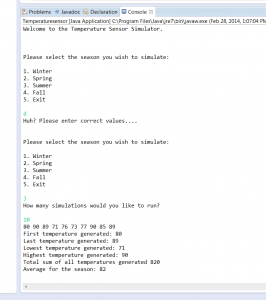In this lab, the task is to take our previous lab, and create methods to execute our program as opposed to simple case statements. So I created 4 methods and then used a switch statement to call those methods when the user inputs his selection. I also was able to account for invalid inputs from the user. If the program asks for a number, and the user inputs a letter, it will ask the user to use a valid input for the program. This creates a program that does what its supposed to do, and remain as error-free as possible.
import java.util.Scanner;
import java.util.Random;
public class Temperaturesensor {
@SuppressWarnings("finally")
public static void main(String[] args)
{
boolean run = false;
System.out.println("Welcome to the Temperature Sensor Simulator.\n");
while(!run){
try{
System.out.println("\n\nPlease select the season you wish to simulate: \n\n"
+ "1. Winter\n"
+ "2. Spring\n"
+ "3. Summer\n"
+ "4. Fall\n"
+ "5. Exit\n");
@SuppressWarnings("resource")
Scanner input = new Scanner(System.in);
int selection = input.nextInt();
switch(selection){
case 1:
getwintertemp();
break;
case 2:
getspringtemp();
break;
case 3:
getsummertemp();
break;
case 4:
getfalltemp();
break;
case 5:
run = true;
System.out.println("Thank you for using the temperature simulator!");
break;
default:
System.out.println("huh? Try Again. Enter a Value from (1-5): ");
}//end of switch
}
catch(Exception e){
System.out.println("Huh? Please enter correct values.... ");
}
} //end of While loop
}
public static void getwintertemp(){
int degrees;
int min = 100; //used 100 so that program can update lower values as they process
int max = 0;
int firsttemp = 0;
int lasttemp = 0;
int sum = 0;
int average = 0;
int simulations;
Random sim = new Random();
System.out.println("How many simulations would you like to run?\n");
@SuppressWarnings("resource")
Scanner input1 = new Scanner(System.in);
simulations = input1.nextInt();
for(int counter=1;counter<=simulations;counter++){ degrees = 21+sim.nextInt(20); System.out.print(degrees + " "); if(degrees>max){
max=degrees;
}
else if(degrees<min){
min=degrees;
}
if(counter==1){
firsttemp = degrees;
}
else if(counter==simulations){
lasttemp = degrees;
}
sum+=degrees;
average = sum/simulations;
}
System.out.println("\n\nFirst temperature generated: " + firsttemp);
System.out.println("Last temperature generated: " + lasttemp);
System.out.println("Lowest temperature generated: " + min);
System.out.println("Highest temperature generated: " + max);
System.out.println("Total sum of all temperatures generated " + sum);
System.out.println("Average for the season: " + average);
}
public static void getspringtemp(){
int degrees;
int min = 100; //used 100 so that program can update lower values as they process
int max = 0;
int firsttemp = 0;
int lasttemp = 0;
int sum = 0;
int average = 0;
int simulations;
Random sim = new Random();
System.out.println("How many simulations would you like to run?\n");
@SuppressWarnings("resource")
Scanner input2 = new Scanner(System.in);
simulations = input2.nextInt();
for(int counter=1;counter<=simulations;counter++){ degrees = 41+sim.nextInt(30); System.out.print(degrees + " "); if(degrees>max){
max=degrees;
}
else if(degrees<min){
min=degrees;
}
if(counter==1){
firsttemp = degrees;
}
else if(counter==simulations){
lasttemp = degrees;
}
sum+=degrees;
average = sum/simulations;
}
System.out.println("\nFirst temperature generated: " + firsttemp);
System.out.println("Last temperature generated: " + lasttemp);
System.out.println("Lowest temperature generated: " + min);
System.out.println("Highest temperature generated: " + max);
System.out.println("Total sum of all temperatures generated " + sum);
System.out.println("Average for the season: " + average);
}
public static void getsummertemp(){
int degrees;
int min = 100; //used 100 so that program can update lower values as they process
int max = 0;
int firsttemp = 0;
int lasttemp = 0;
int sum = 0;
int average = 0;
int simulations;
Random sim = new Random();
System.out.println("How many simulations would you like to run?\n");
@SuppressWarnings("resource")
Scanner input3 = new Scanner(System.in);
simulations = input3.nextInt();
for(int counter=1;counter<=simulations;counter++){ degrees = 71+sim.nextInt(20); System.out.print(degrees + " "); if(degrees>max){
max=degrees;
}
else if(degrees<min){
min=degrees;
}
if(counter==1){
firsttemp = degrees;
}
else if(counter==simulations){
lasttemp = degrees;
}
sum+=degrees;
average = sum/simulations;
}
System.out.println("\nFirst temperature generated: " + firsttemp);
System.out.println("Last temperature generated: " + lasttemp);
System.out.println("Lowest temperature generated: " + min);
System.out.println("Highest temperature generated: " + max);
System.out.println("Total sum of all temperatures generated " + sum);
System.out.println("Average for the season: " + average);
}
public static void getfalltemp(){
int degrees;
int min = 100; //used 100 so that program can update lower values as they process
int max = 0;
int firsttemp = 0;
int lasttemp = 0;
int sum = 0;
int average = 0;
int simulations;
Random sim = new Random();
System.out.println("How many simulations would you like to run?\n");
@SuppressWarnings("resource")
Scanner input4 = new Scanner(System.in);
simulations = input4.nextInt();
for(int counter=1;counter<=simulations;counter++){ degrees = 41+sim.nextInt(20); System.out.print(degrees + " "); if(degrees>max){
max=degrees;
}
else if(degrees<min){
min=degrees;
}
if(counter==1){
firsttemp = degrees;
}
else if(counter==simulations){
lasttemp = degrees;
}
sum+=degrees;
average = sum/simulations;
}
System.out.println("\nFirst temperature generated: " + firsttemp);
System.out.println("Last temperature generated: " + lasttemp);
System.out.println("Lowest temperature generated: " + min);
System.out.println("Highest temperature generated: " + max);
System.out.println("Total sum of all temperatures generated " + sum);
System.out.println("Average for the season: " + average);
}
}




